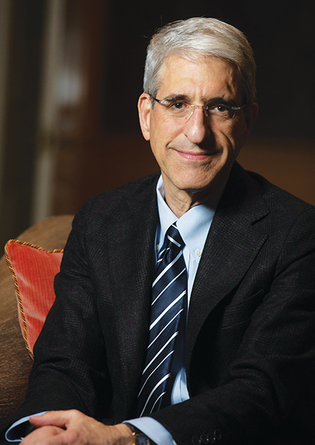

Mark Ostow
The Yale Alumni Magazine publishes a letter from President Peter Salovey ’86PhD in every issue. In this letter, the president discusses the new Wu Tsai Institute, which will move into 100 College Street by the fall of 2022.
View full image
Dear Friends,
Creativity and problem-solving, empathy and intelligence: the mind is responsible for so much of what makes life joyful, meaningful, and fulfilling. Yet it can also be the source of hardship and pain, and scientists still have so many questions about the remarkable organ where it all begins. What causes creativity? Why do we remember some things and forget others? And will machines ever be able to replicate the brain’s abilities and flexibility?
The new Wu Tsai Institute at Yale University, announced in February, will bring together scientists and scholars from across campus to tackle these and other exciting questions. Established through a historic and transformative gift from Joseph C. Tsai ’86, ’90JD, and his wife, Clara Wu Tsai, the institute is dedicated to understanding the brain and mind at all scales—from molecules and cells to circuits, systems, and behavior. By uniting hundreds of faculty and students around this shared goal, the institute will strengthen and transform the landscape of neuroscience at Yale.
When I became president in 2013, I called for a more unified Yale—one that was able to leverage its broad scope but modest size to make contributions only Yale can make. My vision of a more unified Yale calls on us to work across disciplinary, department, and school boundaries in search of life-changing and world-altering discoveries.
The Wu Tsai Institute exemplifies this goal: it harnesses knowledge and resources from Yale’s many disciplines and schools to address complex problems. About 140 groups across Yale are currently engaged in neuroscience research, and the Wu Tsai Institute will promote new partnerships among them. The institute’s home—100 College Street—is a relatively new building, located between Yale’s medical and central campuses, that is designed to promote interaction and innovation. My home department—psychology from the Faculty of Arts and Sciences—and the Department of Neuroscience from the School of Medicine, as well as scholars from several other departments and programs, will also move to this impressive physical space. In addition to bringing faculty and students together in new ways, the institute will allow Yale to recruit faculty members and researchers at the cutting edge of this work.
Understanding cognition—a vast field of related processes and problems—demands both expertise and imagination. As Professor of Psychology Nicholas Turk-Browne ’09PhD, director of the Wu Tsai Institute, said, “The success of the institute . . . requires bold, unorthodox scientific expeditions.” To promote paradigm shifts and creative problem-solving, the institute is structured around three centers focused on different areas of exploration: neurodevelopment and brain plasticity, neurocognition and behavior, and neurocomputation and machine intelligence.
The Wu Tsai Institute will allow us to advance two of Yale’s major scientific priorities for the coming decade: neuroscience and integrative data science. Our significant investment in the sciences will position Yale to address major challenges facing humanity. Advances in our understanding of cognition have the potential to reduce suffering and increase well-being—for individuals and for society. For example, Professor Turk-Browne’s lab is exploring the use of fMRI, a brain imaging tool, on awake infants in order to better understand how humans acquire language and learn new skills. Daniel Colón-Ramos, the Dorys McConnell Duberg Professor of Neuroscience and Cell Biology at the School of Medicine, studies how the organization of synapses in the brain shapes animal behavior, with a host of potential implications, including for the treatment of disease.
The establishment of the Wu Tsai Institute represents a new era in Yale’s exploration of cognition. As someone who has spent decades studying human emotion, it is inspiring for me to imagine what mysteries we will illuminate—and problems we will solve—through this exciting endeavor.
I am deeply grateful to Joe Tsai and Clara Wu Tsai for their extraordinary generosity and commitment to Yale. With gratitude to our alumni and friends, Yale will continue to search for answers and pose new questions about every facet of the human experience. Fostering innovative collaborations among some of the world’s best minds, in order to address the most daunting challenges, is part of our responsibility “to improve the world today and for future generations.” I am more thankful than ever for your support of this vital mission.
With my warmest wishes,
Peter Salovey
President
Chris Argyris Professor of Psychology
 loading
loading

1 comment
-

Mary Ellen Latela, 5:43pm May 29 2021 |  Flag as inappropriate
Flag as inappropriate
The comment period has expired.President Salovey:
I read with enthusiasm your news about the upcoming historic and transformative gift from Joseph C. Tsai ’86, ’90JD, and his wife, Clara Wu Tsai, which is dedicated to brain and mind at all scales—from molecules and cells to circuits, systems, and behavior.
As a result of my career-long interest in psychology as the strong branch of philosophy and as as a starting point for practical application problems in neuroplasticity, machine intelligence, and related fields, I applaud the weaving together of scholars and practitioners in the U.S., led by Richard Anderson, Ph.D,of the Mind and Life Institute and informed by philosopher H.Holiness, the Dalai Lama.
Please keep us appraised of progress with the Institute and events as time passes toward the formal opening.
Warmest wishes,
Mary E. Latela, YDS, 1994.